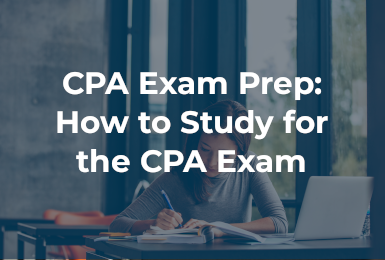Many accounting professionals aspire to become a certified public accountant (CPA). The highly-esteemed designation signifies that the individual has expert knowledge, adheres to high ethical standards, and serves as a testament to their professional integrity.
In addition to the professional designation, a CPA credential expands the career opportunities and salary ranges available to accountants, especially in public accounting firms. These firms provide a range of services to the general public including auditing, consulting, tax services, and accounting services - to both Individuals and organizations.
If you have some accounting experience or are interested in pursuing an accounting-related career path, you may ask yourself questions like, “how do I become a CPA?” and “should I become a CPA?” Please know that an accounting career can still be a rewarding career without the CPA certification if you choose to take that direction. You can also continue your education journey without making that decision right away.
To help you recognize the full extent of what it takes to become a CPA, as well as the benefits of licensure, we’ve gathered some resources and information to guide you through this challenging-yet-rewarding process.
What are the Steps to Becoming a CPA?
The first step to becoming a CPA is to determine which state(s) you would like to work in. CPA licenses are granted by individual state boards of accountancy. Once you obtain your license and become a certified public accountant, you’ll be permitted to practice as a public accountant in that state. Each state will have different eligibility criteria, so be sure to verify your state’s CPA requirements to determine your eligibility status to become certified. You can learn more about each state’s requirements here. It’s worth noting that many states have reciprocity with other states, which means earning your CPA credential in one state may allow you to also practice in a number of other states.
While the intricacies of each board’s CPA requirements will vary, the criteria needed to become a CPA in any state can be organized into three main categories: educational, experiential, and exam requirements.
Educational Requirements
There is a 150 credit hour requirement to sit for the CPA exam. Enrolling in an accredited bachelor’s degree program in accounting will help you fulfill the bulk of those hours. Coursework requirements typically involve:
- 30 semester hours in accounting subjects
- 24 semester hours in business administration subjects
- 15 or more semester hours of upper-level/graduate accounting courses
You will need to have a copy of your transcript ready to submit with your application to sit for the exam. In most states you can do so with a bachelor’s degree and the noted coursework above.
Since bachelor’s degrees are typically 120 credit hours, you will still need 30 more credit hours to become eligible for licensure. Taking additional accounting certifications through Champlain College Online (CCO) will not only allow you to reach these requirements, but will also help advance your accounting knowledge and prepare you for the examinations through practical coursework.
You do not need to have a bachelor's degree in accounting to sit for the exam. Individuals who hold a bachelors in another discipline should look into a master’s degree to advance their technical aptitude and meet the educational requirements needed for their exam.
Review State Requirements
Before pursuing CPA licensure, it’s essential to check your state’s specific requirements through the National Association of State Boards of Accountancy (NASBA). Each state sets its own education and experience criteria, but most require 150 credit hours and passing the Uniform CPA Exam.
Since the CPA exam is rigorous, many candidates enroll in a CPA exam review course to ensure they’re well-prepared. Reviewing state requirements early helps you stay on track and meet all necessary qualifications for licensure.
Experiential Requirements
Candidates must have professional accounting experience in order to qualify for CPA licensure. On average, most states and jurisdictions require one year of public accounting experience.
The most common way to get this experience is to work for a professional accounting firm or other companies specializing in accounting, tax, or audit work. If you had experience as an accountant, you may consider internship opportunities so you can gain experience while you earn your degree.
Again, because of the inconsistencies between state-level requirements, check with your local state board to ensure there are no information gaps that could stand in the way of your journey to becoming certified.
Exam Requirements
All CPA candidates must pass the Uniform CPA Examination® required by AICPA, which is divided into four sections. Each section is a four-hour test that relates to an area of professional proficiency necessary to become a public accountant:
- Auditing and Attestation (AUD)
- Business Environment and Concepts (BEC)
- Financial Accounting and Reporting (FAR)
- Regulation (REG)
Each section of the exam is scored out of 100 points. In order to pass this exam, it is required to receive a passing score of at least 75 points on all four tests.
These four exams can be taken in any order; however, they must all be completed within 18-months of the date of your first scheduled exam. Upon receiving your notice to schedule (NTS), you can register for your first examination. As of July 2020, testing is done on a continuous basis, meaning that you can schedule your next exam whenever is convenient and testing scores will be rolled out accordingly.
Some states will also require CPA candidates to take ethics exams or courses to receive licensure, which can be verified here.
How to Prepare for the CPA Exam
Passing the Uniform CPA Exam requires thorough preparation and a strategic approach. With multiple sections covering financial accounting, auditing, taxation, and business concepts, it's essential to have a solid study plan. Utilizing a CPA exam review course, practicing with real exam questions, and developing strong test-taking strategies can significantly improve your chances of success.
Create a Study Plan
A structured study plan is key to effectively preparing for the Uniform CPA Exam. Break down your study schedule into manageable sections, setting aside dedicated time for each exam topic. Many candidates follow a timeline that aligns with their state’s requirements, ensuring they complete the necessary coursework while preparing for the exam. Sticking to a consistent study routine helps reinforce key concepts and prevents last-minute cramming.
Consider a CPA Review Course
Enrolling in a CPA exam review course can provide the guidance and structure needed to succeed. These courses offer comprehensive study materials, practice exams, and expert-led instruction tailored to the exam’s content. A well-designed review course helps candidates stay on track, identify knowledge gaps, and build confidence before test day.
Focus on Practice Questions and Simulations
The CPA exam includes multiple-choice questions and task-based simulations that test real-world accounting knowledge. Practicing with past exam questions and simulations can improve problem-solving skills and familiarity with exam formats. Many CPA exam review courses include adaptive learning technology that tailors practice sessions based on performance, helping candidates focus on their weak areas.
Develop Test-Taking Strategies
Strong test-taking strategies can make a significant difference in exam performance. Time management is crucial, as candidates must complete each section within strict time limits. Learning how to approach multiple-choice questions, flag difficult ones for review, and tackle simulations efficiently can maximize accuracy and confidence on exam day. Utilizing resources from the National Association of State Boards of Accountancy (NASBA) and expert-recommended study methods can further enhance exam readiness.
Why Should You Become a CPA?
It’s not necessary to obtain your CPA license to have a successful career in an accounting profession; however, career opportunities and benefits within public accounting firms require a CPA credential. The following list outlines the career benefits in the public accounting field that come with professional certification. (NOTE: CPA certification can also be a plus when changing jobs.)
Advancement & Promotion
Many of the large accounting firms usually require junior-level accountants to have their CPA license to receive promotions and advance in their company.
Greater Authorization & Access
Senior-level accounting associates work with high-profile clients and have to sign off on highly sensitive and confidential financial documents that are viewed by the IRS. Without a CPA designation, you are not authorized to sign off on such documentation.
Start Your Own Firm
Unlike accountants and bookkeepers, certified public accountants have the ability to provide their accounting services to the general public; this means they also have the option to open their own private firm.
Generally, other advantages of having a CPA designation include better pay, greater job opportunities, job security, advancement opportunities, and increased credibility.
Earn an Accounting Degree Online with Champlain
It is evident that you will need an extensive educational and technical background in accounting to qualify for CPA licensure. CCO offers a bachelor’s and an associate degree in accounting, as well as a variety of accounting certificates. These programs equip you with the knowledge, practical skills, industry ethics, and best practices needed to prepare you for the CPA exam and a successful career in the accounting field. Champlain also provides an accelerated pathway for students to earn 150 credit hours in four years.
Ready to learn more about the accounting degree programs at CCO?
Download Program Guide
Learn what you can expect from our online bachelor's in accounting program.

Download Program Guide
I acknowledge that, by clicking the "submit" button, I am giving my express written consent to Champlain College and its representatives to contact me about educational opportunities via email, text, or phone, at the phone number above, including my mobile phone, using an automatic dialer, or pre-recorded message. Message and data rates may apply. I understand that my consent is not a requirement for enrollment, and I may withdraw my consent at any time.






